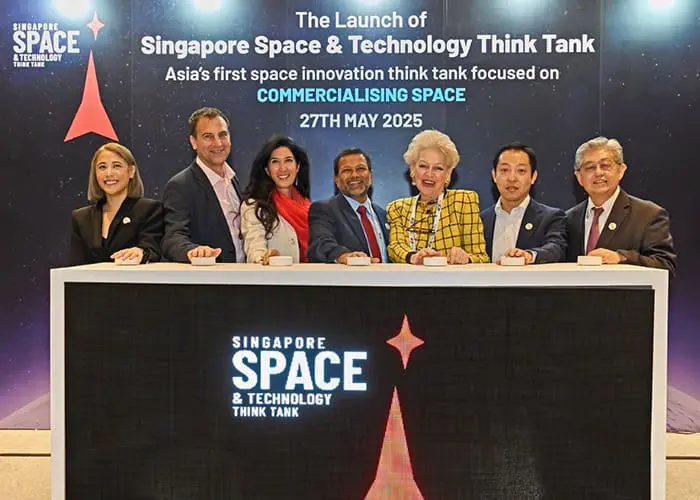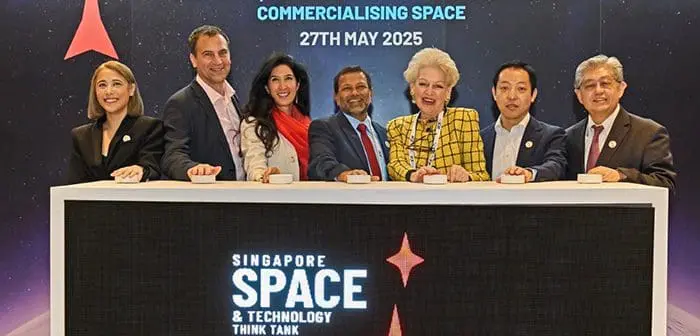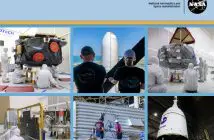
Singapore Space & Technology Ltd (SSTL) has officially relaunched as the SST Think Tank, Asia’s first global space think tank dedicated to mainstreaming space and commercialising space technologies across non-space sectors.
Founded in 2007, SSTL has spent nearly two decades building the region’s space ecosystem, from convening global players at the Global Space and Technology Convention (GSTCE) to facilitating international missions and capacity-building for startups.
The pivot to the SST Think Tank brings added firepower, global reach, and intellectual leadership to that original mission. SST Think Tank will continue to anchor the annual GSTCE, which doubled in size in its 2025 edition and will now benefit from the expanded international profile and networks of the new Council.
“Asia has long been a quiet powerhouse in space, but we’re now reaching critical mass,” said SST Think Tank Council Chairperson Kartik Sheth. “The SST Think Tank is both a signal and a solution. We are here to catalyse commercial outcomes and shift space into the mainstream of global business strategy.”
“I am delighted to be accompanied in the Council by such prestigious global leaders as Raha Hakimdavar, Hidetaka Aoki, Candace Johnson, and Jason Bender,” he added.
With the cumulative value add of increased Earth observation adoption in Asia Pacific projected to hit an astounding USD619 billion by 2030 and commercial downstream applications already outpacing upstream investments, the SST Think Tank is positioned to transform space into an economic enabler across industries such as sustainability, environmental, AI, Quantum, cyber security, robotics, IoT, logistics, health tech, insurance, and finance including climate resilience, supply chain security, digital infrastructure, and advanced manufacturing.
The SST Think Tank will tackle space commercialisation through:
- Innovation labs and strategy sprints – Hands-on problem-solving with corporates and regulators.
- Space industry showcases – High-visibility platforms such as GSTCE for business matchmaking.
- KOL-Led content and roundtables – Co-creation of research and market intelligence with global leaders.
- Sector deep dives and market insights – Whitepapers, trend reports and cross-sector workshops.
“The SST Think Tank brings together a cross-section of global talents, each representing important space economies, to accelerate the adoption of space technology,” said SST Think Tank General Manager Nicolette Yeo. “This is our answer to unlocking the $619 billion space economy opportunity for Asia and to contributing to the global space-enabled economy overall.”
At its launch, SST Think Tank unveiled two anchor initiatives that demonstrate the breadth of reach of the SS Think Tank:
SST Growth Lab: The Growth Lab will help Asia’s space companies internationalise their technologies and business models, tapping on the expansive network of the SST Think Tank Council, who represent every major space region, including the US, Europe, Middle East, Japan and Australia. The Growth Lab will include elements such as:
- Connecting startups to global space corporates and investors.
- Offering tailored market-entry sprints, policy exposure, and trade facilitation.
- Providing in-market business development and fundraising support.
- Organising investor demo days in top global funding capitals.
- Convening industry dialogues with public-private stakeholders across Asia and beyond.
- Hosting engagements with the SST Think Tank Council to align global insights with startup needs.
Deloitte-SST Executive Leadership Program: Developed in collaboration with Deloitte, this flagship course uses the lens of space innovation to train senior business leaders in applying space principles to terrestrial challenges. Modules include:
- Moonshot thinking: Pairing bold vision with concrete multi-year planning.
- Experimentation at the edge: Building risk-tolerant innovation cultures.
- Systems thinking at scale: Applying interdependency awareness to modern enterprises.
- Mission-driven leadership: Strengthening purpose alignment in high-performance teams.
- Resilience engineering: Using failure simulations and scenario planning as leadership tools.
The formation of the SST Think Tank bridges deep space expertise with terrestrial market needs, serving as a global convenor, knowledge hub, and catalyst for next-generation partnerships. As space becomes central to climate resilience, supply chain security, digital infrastructure, and advanced manufacturing, SST Think Tank invites corporate leaders, policymakers, and entrepreneurs to collaborate in building an inclusive, innovation-driven global space economy, starting in Asia.





